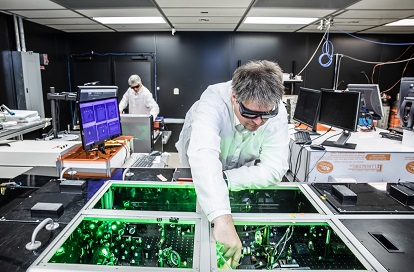
Startup to Shrink Miles-long Plasma Accelerators to Room Size
Austin, Texas-based TAU Systems raised $15 million in seed investment that the company will use to develop compact particle accelerator technology. According to the company, the laser-driven particle accelerators and x-ray free-electron lasers (XFEL) that it will develop will give unprecedented access to ultrasmall objects evolving at ultrahigh speed and under extremely powerful conditions.
Existing high-energy particle accelerators are highly complex operations. For example, the European Organization for Nuclear Research’s (CERN) Large Hadron Collider (LHC), which is located in Switzerland and is the world’s largest and most powerful particle accelerator, features a 27-km (17-mile) ring of superconducting magnets. The accelerator sits in a tunnel 100 m underground.
TAU aims to make particle accelerators that are room-size and available to buy or access through service center model for applications in biotech, energy, agriculture, and nuclear waste reduction.
“Until now, the world’s most powerful accelerators have simply been too large and too expensive to be a realistic tool for the vast majority of scientific and corporate users,” said Bjorn Manuel Hegelich, CEO of TAU Systems. “We believe that access to our machines will have transformative impacts across almost every industry and the economy.”

TAU Systems CEO and founder Bjorn Manuel Hegelich aligns laser beams in a laser system at TAU’s facility in Austin, Texas. The company aims to open access to particle accelerators by significantly cutting the size of their operation, as well as their cost, and enhancing their sustainable footprint. Courtesy of TAU Systems.
TAU Systems will offer beamtime, data acquisition, and analysis as a full-service supplier, as well as complete laser-driven accelerators and XFEL systems for sale. The company is building academic and industrial partnerships to develop the laser technology and leverage recent scientific and technological advances. It aims to offer its first products for sale in 2024, have an XFEL service center operational by 2026, and start selling full XFEL systems by 2027.
TAU Systems was founded in 2021 by Hegelich, a professor at the University of Texas at Austin and an expert in laser plasma interaction. The company is growing its team, which includes experts from the Stanford Linear Accelerator, the Laboratory for Laser Energetics at the University of Rochester, and Los Alamos National Laboratory. It received its $15 million seed investment from serial tech investor Lukasz Gadowski.
Published: September 2022